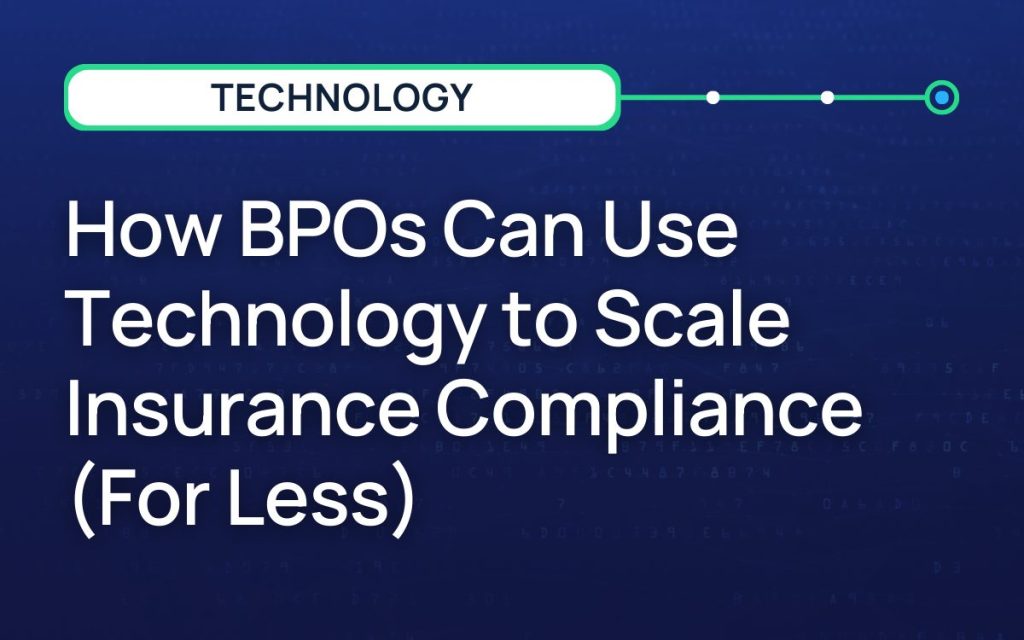How BPOs Can Use Technology to Their Scale Insurance Compliance (and spend less!)

There are as many ways to “do business” as there are businesses. That is to say, no two organizations are the same. However, broadly speaking, some companies prioritize doing all of their operations in-house; others prefer to outsource everything except their core functions, and a majority of companies fall somewhere in between the two extremes.
Within the insurance industry, companies span from as small as a single-person independent agency to as large as a global insurance carrier with hundreds of thousands of employees. It goes without saying that the size of a company, the type of business it does, and its available resources will all factor into its preference for in-house versus outsourced operations.
However, there are some common challenges that ring true for everyone in insurance regardless of their company size.
These include:
- An aging and quickly retiring workforce
- A lack of new professionals entering the industry
- Consumer and employee demands for a digital experience
- Rising costs and concerns related to cybersecurity
While this list is abbreviated, these four issues alone can lead insurance businesses to look for unique solutions for their operational challenges.
Challenges like:
- A small independent insurance agency that needs to get the word out about its services but doesn’t have the money for digital marketing
- A large insurance brokerage that’s struggling to find employees with the skills to manage its complex HR and payroll needs
- A global insurance company that has hundreds of downstream agencies and thousands of individual agents/producers contracted to sell its products and doesn’t want to allocate an entire department to managing appointments and license compliance
In any of these situations (along with many, many others), a business may consider partnering with a business process outsourcing company, commonly known as a BPO.
What is a BPO?
A BPO is a company that specializes in taking business processes (things like accounting, IT, customer support, and more) off the plate of another business. Sure, a business could hire a good, old-fashioned contractor (either a single person or a small agency) to do this same kind of outsourcing. Unlike hiring a contractor, however, partnering with a BPO adds value to the equation by managing the outsourcing process from start to finish for one, or multiple types of operations.
BPOs also give their clients the benefit of their large scale and specialized expertise. They typically focus on an industry and/or type of operation: data entry, HR, or technical support within a vertical like manufacturing or insurance – for example. When an entire organization’s focus is on providing the best [insert type of business process] to the [insert industry], clients get a level of service and expertise they couldn’t afford as a one-off.
How do BPOs help the insurance industry?
For most insurance businesses, whether agencies, carriers, MGAs, MGUs, or any other type, the top priority is selling insurance policies, along with activities directly related to that revenue. Most of these same businesses aren’t (and don’t want to be) experts at printing marketing materials, performing various IT functions, running payroll, or staffing call centers. For insurance businesses in this position, working with a BPO to provide one or several different functions can allow the organization to focus on its core mission and leave the other (highly necessary) parts of running a business to their outsource partner.
BPOs can specifically help insurance industry businesses with technology because there’s often a high cost of entry for the best tech solutions. Imagine a 10-person insurance agency that wants to leverage artificial intelligence to help detect fraudulent claims before sending those claims on to their carrier partners. Something like that would be prohibitively expensive for a small business on its own. But, by working with a BPO, which also works with a large number of insurance agencies of all sizes, this small agency can access advanced tech it couldn’t get on its own.
It’s this “economy of scale” that makes choosing to partner with BPOs a smart choice for lots of insurance businesses. Beyond technology, BPOs help insurance carriers, agencies, and others with data entry, billing, printing and mailing, and so much more, all without the business having to seek out separate vendors or contractors for each type of service it needs.
BPOs and insurance compliance
Since BPOs have a reputation for being where insurance businesses can turn to for help with some of the more manual and tedious business processes that aren’t directly revenue-generating, it makes sense that agencies, carriers, and MGAs might look to them for help with maintaining producer license compliance and/or state carrier appointments.
Some insurance organizations simply can’t staff an internal department to manage compliance. Maybe they’re having a hard time finding qualified candidates for the role. Maybe it’s too expensive to hire someone capable of the task. Maybe current employees who’re managing compliance on top of their “real jobs” are getting burned out and threatening to leave. Despite these challenges, producer license compliance isn’t an optional part of working in insurance.
This is how BPOs with a robust and highly experienced compliance team can come to the rescue of other insurance businesses that need that level of compliance management but can’t do it internally for a variety of reasons.
How BPOs can use technology to scale insurance compliance services
Let’s say you’re a BPO that takes the arduous task of insurance compliance management off your clients’ plates. You hire the best compliance managers you can find and each one of them can stay on top of about 10 producers with licenses needing to be applied for or renewed in five states each day. This doesn’t sound like a lot, but because so much manual work goes into verifying each producer’s license in each state, this is what your highly experienced (and highly paid) compliance manager can do.
And then business grows and you get more insurance agencies that want you to manage their producer compliance. So, logically, you hire another compliance expert. Each person you hire has similar limitations on their capacity. There’s just a finite number of producers any compliance manager can deal with in a day. So, you bring on lower-level employees or temps to fill the gaps. But they aren’t experts like your compliance managers, so they need training and supervision, which in turn reduces your expert staff’s bandwidth and lowers the number of producer licenses they can deal with daily.
When you imagine this scenario, it’s clear that managing compliance the way it’s historically been done isn’t scaleable. For every new client that wants your BPO’s help with insurance compliance, you have to hire more staff to do the job. Not only are you spending more money with each new client you take on, the risk also goes up. All the manual effort means there’s even more room for human error – like someone missing a renewal deadline or forgetting to update background check questions. With insurance clients counting on you to manage their compliance, you can’t afford to accidentally leave them in a position where a state could impose a fine or other penalty.
This is where BPOs can really win using a modern, automated compliance solution like AgentSync. We’re not saying it has to be AgentSync, as long as it does what you need.
In this case, those needs may include:
- The ability for just one person to manage hundreds or thousands of producers across different lines of business and in different states
- Visibility into up-to-date information on each producer’s status, directly from NIPR
- A producer scorecard that gives your compliance manager a birdseye view of every producer’s license “health” and flags any states or lines of business that are at risk of non-compliance
- Features like bulk imports and bulk terminations based on a producer’s NPN
- The flexibility to deactivate producers who change jobs, change states, or leave the business entirely and to reactivate them if they come back, with a single click
With capabilities like these, a BPO can offer affordable insurance compliance services to its clients without the inherent risk that comes with managing it by hand, and without the cost that comes with the need to increase compliance staff at the same rate compliance customers come in.
BPOs and AgentSync
If you’re a BPO that’s trying to solve your clients’ compliance challenges without creating exponentially more headaches for yourself, AgentSync can help.
If you’re an insurance agency, carrier, MGA, or MGU that works with a BPO and would like to get compliance off your plate (without adding risk or even more cost), AgentSync can help.
AgentSync connects the insurance distribution channel from carriers to agencies to producers, and everyone in between. We help organizations scale (not just grow), and make sure that compliance never has to compete with growth or profits.

